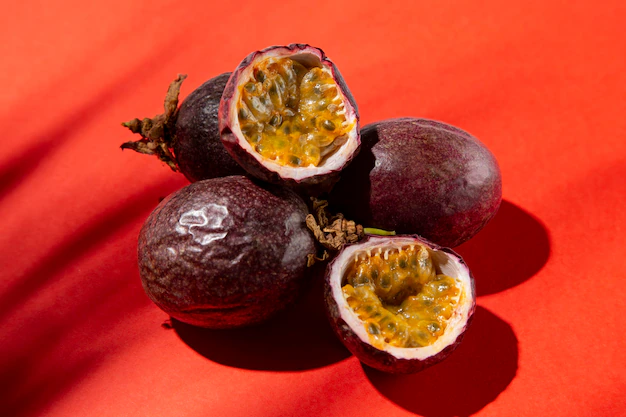
Passion fruit, also known as Passiflora edulis, is a tropical fruit that is not only delicious but also packed with essential nutrients. During pregnancy, it becomes even more important to focus on a healthy diet to ensure optimal nutrition for both the mother and the developing baby. Incorporating passion fruit into your pregnancy diet can offer numerous benefits, thanks to its rich nutritional profile.
The importance of a healthy diet during pregnancy
Maintaining a healthy diet during pregnancy is crucial for the well-being of both the mother and the baby. A balanced diet helps provide the necessary nutrients, vitamins, and minerals that support proper growth and development. It is recommended to consume a variety of fruits, vegetables, lean proteins, whole grains, and healthy fats to ensure a well-rounded diet. Passion fruit can be an excellent addition to this diet, offering additional nutritional benefits that contribute to a healthy pregnancy journey.
Nutritional benefits of passion fruit during pregnancy
Passion fruit is a nutritional powerhouse, containing a wide array of vitamins and minerals that are essential during pregnancy. It is an excellent source of vitamin C, antioxidants, and dietary fiber. Let’s explore these benefits in more detail.
Vitamin C and its role in supporting a healthy immune system
During pregnancy, a strong immune system is vital to protect both the mother and the developing baby. Vitamin C plays a crucial role in strengthening the immune system by supporting the production of white blood cells, which are responsible for fighting off infections. Passion fruit is a great source of vitamin C, providing a significant portion of the recommended daily intake. By incorporating passion fruit into your diet, you can help boost your immune system and protect against common illnesses.
Antioxidants in passion fruit and their impact on prenatal health
Antioxidants are compounds that help protect the body against oxidative stress and damage caused by free radicals. During pregnancy, the body is more susceptible to oxidative stress due to increased metabolic demands. Passion fruit is rich in antioxidants, such as vitamin A, vitamin C, and flavonoids, which can help reduce the risk of pregnancy complications and promote overall prenatal health. These antioxidants also play a critical role in the development of the baby’s organs and tissues.
Fiber content in passion fruit and its benefits for digestion
Digestive issues are common during pregnancy due to hormonal changes and the growing uterus putting pressure on the digestive organs. Including fiber-rich foods in your diet can help alleviate constipation, a common issue during pregnancy. Passion fruit is an excellent source of dietary fiber, which promotes healthy digestion and prevents constipation. Consuming passion fruit regularly can help regulate bowel movements and keep the digestive system running smoothly.
Promoting healthy fetal development with passion fruit
The development of the baby’s organs and tissues is a crucial process during pregnancy. Passion fruit contains essential nutrients that contribute to healthy fetal development. It is rich in vitamins A, C, and E, which are important for the growth and development of the baby’s eyes, skin, and immune system. Additionally, passion fruit is a good source of folate, a B-vitamin that plays a vital role in preventing neural tube defects, such as spina bifida. By incorporating passion fruit into your pregnancy diet, you can support the healthy growth of your baby.
Incorporating passion fruit into your pregnancy diet
Now that we understand the many benefits of passion fruit during pregnancy, it’s important to explore ways to incorporate it into your diet. Passion fruit can be enjoyed in various ways, both as a standalone fruit or as an ingredient in recipes. Here are a few ideas to get you started:
- Fresh passion fruit: Simply cut the fruit in half and scoop out the juicy pulp with a spoon. Enjoy it as a refreshing snack or add it to your favorite fruit salad.
- Passion fruit smoothie: Blend fresh passion fruit pulp with other fruits like bananas or berries, yogurt, and a bit of honey for a delicious and nutritious smoothie.
- Passion fruit sauce: Extract the juice from the passion fruit and simmer it on low heat with a bit of sugar or honey until it thickens into a sauce. Drizzle it over pancakes, waffles, or Greek yogurt for a tangy and sweet flavor.
Precautions and considerations when consuming passion fruit during pregnancy
While passion fruit can be a beneficial addition to your pregnancy diet, it’s important to exercise some precautions and considerations. Here are a few things to keep in mind:
- Allergies: Some individuals may be allergic to passion fruit. If you have a known allergy to passion fruit or any other fruits, it’s best to avoid it during pregnancy.
- Moderation: As with any food, it’s important to consume passion fruit in moderation. Overconsumption may lead to digestive discomfort or other unwanted effects.
- Quality and cleanliness: Ensure that the passion fruit you consume is fresh, ripe, and free from any mold or damage. Wash the fruit thoroughly before consuming to remove any potential pesticides or contaminants.
Conclusion: The role of passion fruit in a healthy pregnancy journey
Incorporating passion fruit into your pregnancy diet can provide numerous nutritional benefits that contribute to a healthy pregnancy journey. From boosting the immune system with vitamin C to promoting healthy fetal development with essential vitamins and minerals, passion fruit is a delicious and nutritious addition to any expecting mother’s diet. Remember to consult with your healthcare provider before making any significant changes to your diet and enjoy passion fruit in moderation for a healthy and enjoyable pregnancy experience.
CTA: Consult your healthcare provider and start incorporating passion fruit into your pregnancy diet today for a healthy and nutritious journey.






